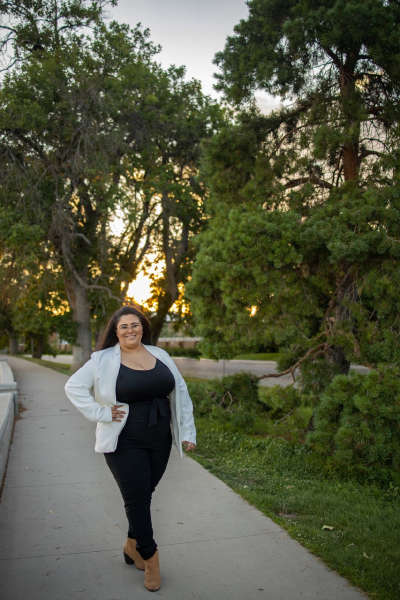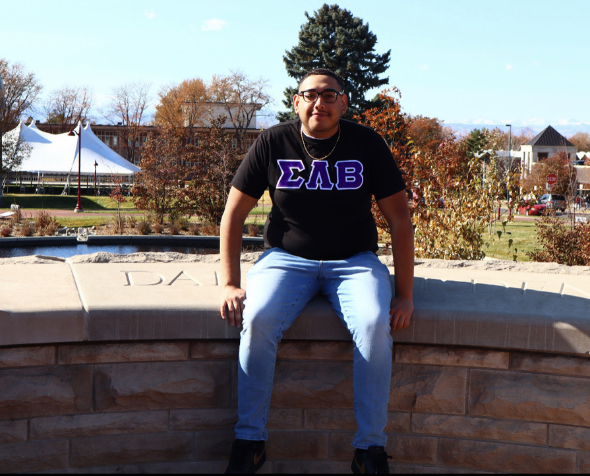“I Matter” — Critical Race & Ethnic Studies Student Is a Voice for Students of Color
Senior Andrea Macias epitomizes the type of voices that we need to hear more of on the University of Denver campus. As someone who identifies as Afro Latina, Macias has spent her time at DU encouraging conversations and being a voice for change on campus and around the world.
Macias chose to major in history and minor in critical race and ethnic studies (CRES) and socio-legal studies to learn more about the topics and because she found a community in the spaces that these degrees offered.
“I love history because it shows progression, and I like the context and the perspective that history brings. I’ve also always wanted to go to law school, which is why I chose socio-legal studies,” says Macias. “With everything that happens at DU, especially for students of color like myself, the ethnic studies minor provided that space that we need to delve into our own stories, our own history and to be acknowledged.”
Through the CRES minor, Macias made a connection with one of her favorite professors, Elizabeth Escobedo.
“The very first class I took at DU was Immigration and 20th Century America with Professor Escobedo. I was the only freshman in the class, and it was after that class that she chose to be my history advisor and has since been my advisor for my thesis and minors as well,” says Macias. “She’s incredible. She really takes the time to understand and work with her students, especially those that do come from underrepresented backgrounds, like myself. I would consider her a mentor, not just my advisor, and I don’t know if I would even be continuing without her.”
Not only has she found community in the classroom, but Macias has also found community through DU’s Latine Student Alliance (LSA) and the first multiculturally based Greek organization at DU, the sorority Pi Lambda Chi Latina Sorority, Inc. (PLC). This non-exclusive, Latina-based sorority was founded in 2006 to help preserve Latina culture. They hold an annual conference, Empowering Women of Tomorrow, which provides free youth leadership workshops on financial aid, applying to college, women’s health, art therapy, mental health awareness and more for high school students in Colorado.
Additionally, Macias works as a senior lead organizer for the nonprofit Our Turn Colorado, a group that focuses on educational equity within Denver public schools.
“We just finished our mental health campaign, which will implement a pilot program at DPS to require all staff to take trauma-informed training and to add more mental health professionals within their schools,” says Macias. “We want the counselors to reflect the communities they serve, so if the majority of the community at the school is Latinx, then the counselors will reflect that identity as well.”
Ultimately, Macias is all about advocating for change in her community. She acknowledges the necessity of learning about ethnic studies and the importance of preserving Latinx culture. Because DU doesn’t currently have an ethnic studies department or common core requirement, Macias is lobbying for this change.
“Racism, sexism — all the ism’s — aren’t genetic, they’re taught, and they’re learned. By introducing diversity, inclusion and equity when students start college, you’re introducing that those are good things,” says Macias. “For me, ethnic studies are an acknowledgement that my history, my ancestors, my people, my peers, we matter. Our history and our stories matter.”
After she graduates, Macias hopes to join the Alum Service Corps to continue to bring change to her community.
“The Alum Service Corps is for students who have graduated from Jesuit schools to return and teach,” says Macias. “I specifically want to go back to my high school, which is 95% Latinx and has a 100% graduation rate, something that you don’t normally hear of in the Latinx community. So, I know that they do good work and impact the community, and I want to continue to advocate for them.”
Although Macias is a fierce advocate for social justice, it can be a frustrating and difficult process.
“I don’t think people fully understand the mental and emotional toll that students of color experience,” says Macias. “It just hurts because my life should matter too. It shouldn’t just matter for a picture, but my existence as a person, as a student, my history and my safety should matter too.”






